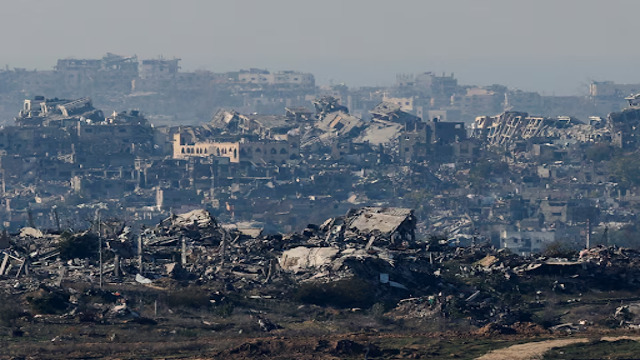
Buildings in the Gaza Strip are destroyed due to the ongoing conflict between Israel and Hamas, as viewed from southern Israel. Reuters
Israeli airstrikes across the Gaza Strip on Thursday resulted in the deaths of at least 68 Palestinians, including prominent figures in the Hamas-controlled police force. The attack targeted a tent camp in the Al-Mawasi district, where the head of Gaza's police, Mahmoud Salah, and his aide, Hussam Shahwan, were killed. Both were part of a team that was visiting the camp, which has been affected by the ongoing war.
The Israeli military confirmed the strike, stating that Shahwan, who served as the head of Hamas' security forces in southern Gaza, had been eliminated in an intelligence-based operation. However, they did not address Salah's death in their statement. Israel claims the strike was aimed at Hamas militants operating in the area, accusing them of hiding in civilian zones, though Hamas denies these allegations.
The Al-Mawasi district had previously been designated as a humanitarian zone, an area supposed to offer safety to civilians. The attack raised significant concerns about the safety and effectiveness of such zones, as Philippe Lazzarini, the head of the U.N. agency for Palestinian refugees, pointed out. He emphasized that as long as there is no ceasefire, the suffering in Gaza will continue to escalate.
An Israeli tank leaves the Gaza Strip as the conflict between Israel and Hamas continues, in southern Israel, on January 2, 2025. Reuters
In addition to the deaths in Al-Mawasi, other airstrikes took place across Gaza, including in the Khan Younis district, the Jabalia refugee camp in the north, and Gaza City. At least 57 more Palestinians were reported killed, with several attacks targeting Hamas militants in key locations, such as a command center embedded in a municipality building.
Despite the Israeli military's claims that it follows international law and takes precautions to reduce civilian harm, the continued high death toll indicates the ongoing challenges of fighting in such a densely populated area. Gaza's health ministry has reported that over 45,500 Palestinians have been killed since the conflict began, and much of the region's infrastructure has been severely damaged. The war, which began in October 2023 after a Hamas-led attack on Israel, has displaced nearly all of Gaza's 2.3 million residents, adding to the suffering of those caught in the conflict.
A Palestinian child stands beside a damaged shelter at a tent camp for displaced people in the Al-Mawasi area of Khan Younis, southern Gaza Strip, following an Israeli airstrike, amid the ongoing Israel-Hamas conflict on January 2, 2025. Reuters
Hamas' ally, the Islamic Jihad group, retaliated by launching rockets into southern Israel, though Israel’s military intercepted one of the projectiles. As the war continues, the situation in Gaza grows more dire with each passing day, leaving little hope for a swift resolution to the crisis.















